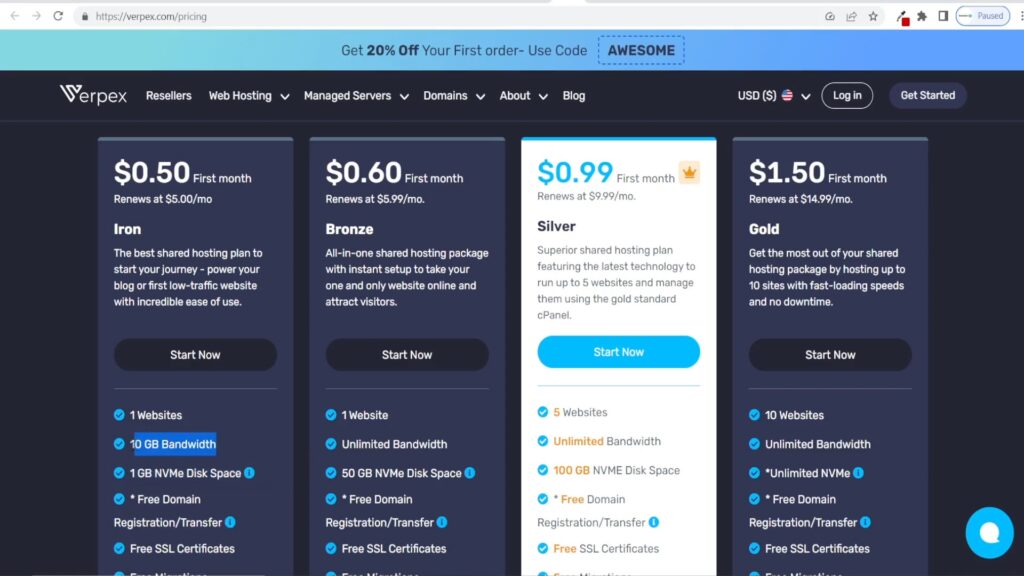When it comes to choosing a hosting plan for your website, one of the most critical factors to consider is storage and bandwidth. These two factors determine how much data your website can store and how much traffic it can handle. Without adequate storage and bandwidth, your website may suffer from slow loading times, downtime, and even crashes. In this article, we’ll explore how to find the optimal storage and bandwidth in a hosting plan for your website.

What is Storage?
Storage refers to the amount of data your website can store on the hosting provider’s servers. This includes your website files, images, videos, and any other content you want to host on your website. The storage capacity of a hosting plan is usually measured in gigabytes (GB) or terabytes (TB).
How Much Storage Do You Need?
The amount of storage you need depends on the size and complexity of your website. For a small website with a few pages and minimal content, a hosting plan with 5GB of storage may be sufficient. However, if you have a large website with lots of multimedia content, you may need a hosting plan with 50GB or more of storage.
When determining how much storage you need, it’s essential to consider the growth potential of your website. As your website grows, you’ll need more storage to accommodate new content, features, and functionality. It’s a good idea to choose a hosting plan that can easily scale up as your website expands.
What is Bandwidth?
Bandwidth refers to the amount of data your website can transfer to and from the hosting provider’s servers. This includes website traffic, file downloads, and any other data that passes through your website. Bandwidth is usually measured in gigabytes (GB) per month.
How Much Bandwidth Do You Need?
The amount of bandwidth you need depends on the amount of traffic your website receives. If you have a small website with low traffic, a hosting plan with 5GB of bandwidth per month may be sufficient. However, if you have a high-traffic website, you may need a hosting plan with 50GB or more of bandwidth per month.
It’s essential to consider the potential for traffic spikes when choosing a hosting plan. If your website experiences a sudden surge in traffic, you’ll need enough bandwidth to handle the increased load. A hosting plan with unlimited bandwidth can be a good option if you anticipate significant traffic growth or occasional spikes.
Shared Hosting vs. VPS Hosting vs. Dedicated Hosting
When it comes to choosing a hosting plan, you’ll also need to decide between shared hosting, VPS hosting, or dedicated hosting. Each option has different storage and bandwidth limits and can impact the performance of your website.
Shared Hosting: In shared hosting, multiple websites share a single server and its resources. This makes it a cost-effective option, but it also means that your website’s performance can be affected by other sites on the same server. Shared hosting plans typically have limited storage and bandwidth, making them best suited for small websites with low traffic.
VPS Hosting: Virtual Private Server (VPS) hosting is a more advanced option that provides dedicated resources to your website. While multiple websites still share the same physical server, each site has its own virtual server with dedicated resources. VPS hosting plans typically have more storage and bandwidth than shared hosting plans and can handle higher levels of traffic.
Dedicated Hosting: Dedicated hosting gives you complete control over a physical server dedicated solely to your website. You have full access to all its resources, including storage and bandwidth. Dedicated hosting plans are the most powerful and expensive option, making them best suited for high-traffic websites or resource-intensive applications.
Tips for Finding the Optimal Storage and Bandwidth in a Hosting Plan
Now that we’ve covered the basics of storage and bandwidth, here are some tips to help you find the optimal storage and bandwidth in a hosting plan for your website:
- Determine your website’s size and complexity: Before choosing a hosting plan, it’s essential to understand the size and complexity of your website. This will help you determine how much storage and bandwidth you need to support your website’s content and traffic.
- Consider your website’s growth potential: Your website’s storage and bandwidth needs may change over time as your site grows and attracts more traffic. It’s a good idea to choose a hosting plan that can easily scale up as your website expands.
- Look for a hosting provider with a good reputation: Choosing a reliable hosting provider is critical to ensuring your website’s performance and uptime. Look for a provider with a good reputation for fast loading times, reliable uptime, and excellent customer support.
- Evaluate the hosting provider’s storage and bandwidth limits: When comparing hosting plans, be sure to evaluate each provider’s storage and bandwidth limits. Look for plans that offer enough storage and bandwidth to support your website’s current and future needs.
- Consider the type of hosting: Shared hosting, VPS hosting, and dedicated hosting all have different storage and bandwidth limits and can impact your website’s performance. Consider your website’s size and traffic levels when choosing the type of hosting that’s best suited for your needs.
- Check for any additional features or services: Some hosting plans may include additional features or services that can help optimize your website’s performance. Look for plans that include features like website backups, security measures, and website builders.
Finding the optimal storage and bandwidth in a hosting plan for your website is critical to ensuring fast loading times, reliable uptime, and excellent user experience. Be sure to evaluate your website’s size, growth potential, and traffic levels when choosing a hosting plan and consider the type of hosting that’s best suited for your needs. With the right hosting plan and provider, you can ensure your website is always available and performing at its best.
